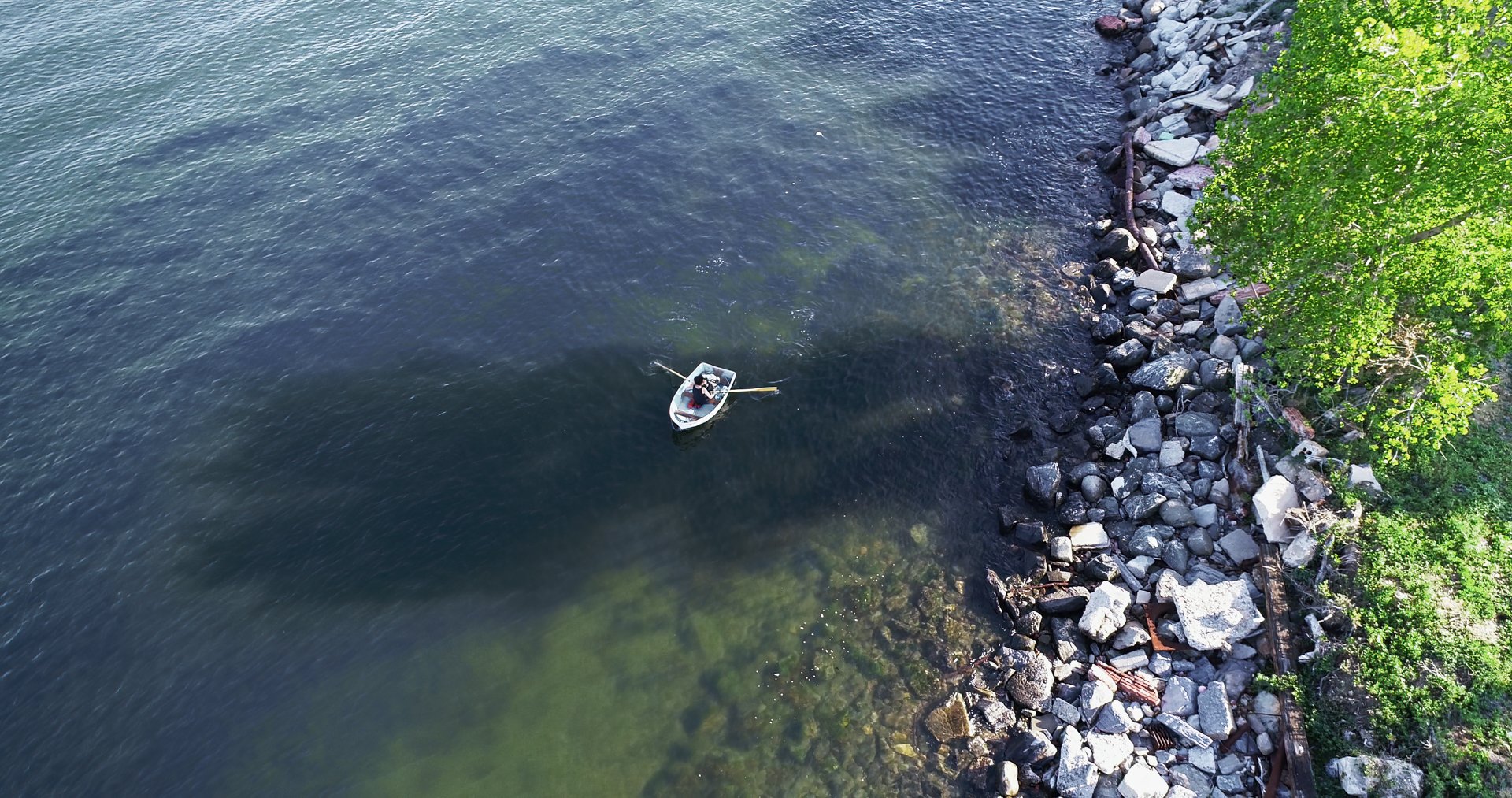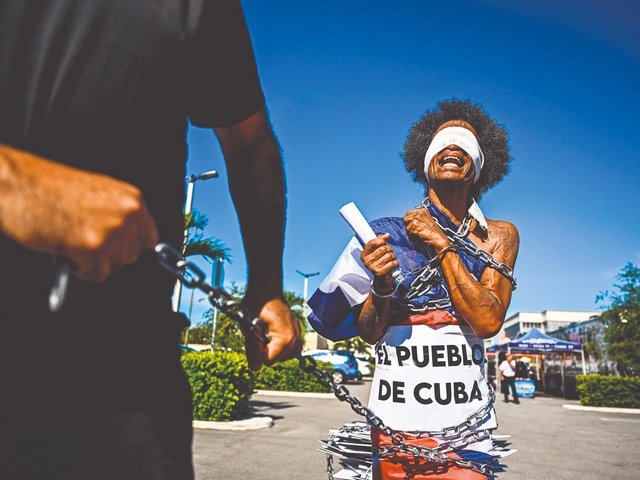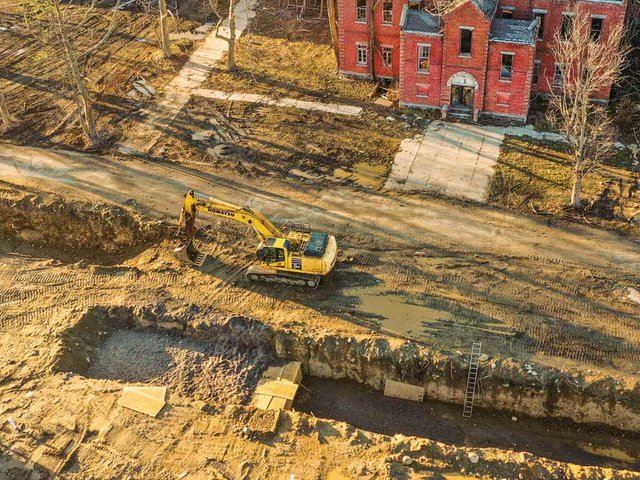In a new publication dedicated to the Cuban-US artist Coco Fusco (Tomorrow, I Will Become an Island), the art historian Olga Viso writes: “Fusco is a bellwether figure in the realm of performance art and its crossings. Her interdisciplinary art practice and scholarly and critical writing are foundational in contemporary performance studies.” Fusco has indeed been a powerful presence in the debates around identity, feminism, postcolonialism and geopolitics, especially in Cuba, since the 1980s, making this monograph, the first dedicated to the artist, long overdue.
The book features works dating from 1990 to 2022, including the photographic series Paquita y Chata (1996), made in collaboration with Nao Bustamante, which focuses on Latin women’s sexuality. Meanwhile, Fusco’s sculpture entitled The Tin Man of the Twenty-First Century (2018) depicts the former US president, Donald Trump, as a ten-foot-tall rendition of the Tin Man—the (literally) heartless figure who tags along with Dorothy and her gang in The Wizard of Oz. In the book, Fusco also outlines the development of Bills Burning the Street, a project that launched at the Untitled Art fair in Miami in 2021, in which currency was stamped with messages of support for freedom of expression in Cuba (Bills Burning the Street is a work by Hamlet Lavastida). The monograph accompanies a touring retrospective which opens this month at the KW Institute for Contemporary Art in Berlin (14 September-7 January 2024). We asked Fusco about the significance of the book.
The Art Newspaper: In the introduction, Krist Gruijthuijsen, the director of KW Institute for Contemporary Art, writes: “Her work critically examines society from a postcolonial perspective, touching upon cultural-political debates in the Americas, Europe, and beyond.” Is this a fair analysis of your practice and outlook?
Coco Fusco: I think it is fair. Is fairness really key here though? Krist provides a very brief introduction. The really substantive and detailed analyses are the contributions by Anna Gritz, Antonio José Ponte, Julia Bryan Wilson and Jill Lane. Those essays are extremely well written, thoughtful and incisive and provide a range of points of view about my work and the interdisciplinary nature of my practice. I am very happy about that.
The monograph is a comprehensive and insightful record of your interdisciplinary projects, bringing to the fore important early works such as Stuff (1996-99) and Rights of Passage (1997). Is this overview of your career satisfying—or frustrating in any way?
It is very satisfying. I have been lucky over the years that many scholars have written about my work in academic journals and books. That said, I have never had a catalogue printed for any of my exhibitions. It's quite common in Europe for artists to have catalogues made for every exhibition. That happens much less frequently in the US, if you don't have an art dealer with deep pockets. So for me this book is precious. It's a milestone.

Coco Fusco, Your Eyes Will Be an Empty Word, 2021.
Courtesy Alexander Gray Associates, New York © 2023 Coco Fusco / Artists Rights Society (ARS), New York
Your Eyes Will Be an Empty Word (2021) is partly about anonymous victims of Covid-19 buried on Hart Island, New York. In an interview with The Art Newspaper, you said: “It was highly likely, I thought, that they would have been undocumented immigrants without family with them or indigent people, homeless people”. Is your work about giving nameless individuals recognition?
I would not describe the work as being "about anonymous victims of Covid 19 buried at Hart Island”. The video is about the effect of the presence of the dead among the living. It is a meditation on death and how we manage our fear of it. I recorded the video around and above Hart Island where many nameless people are buried in a potter's field, but it is not about them, per se.
You have been instrumental in recent years in highlighting human rights abuses in Cuba, highlighting the plight of the imprisoned artist Luis Manuel Otero Alcántara for instance. Is this approach about “refining a politics of discomfort”, as Julia Bryan-Wilson describes in her essay?
I have been collaborating with artists in Cuba since 1985. I've written dozens of articles, published a book about performance art and politics in Cuba, curated exhibitions, supported independent art endeavours, performed on the island and made six films. Whenever Cuban artists I know have encountered difficulties, I have tried to support them as I could. Julia's essay is about my performance art, not my activist endeavour so I don't feel it's appropriate to use her terminology to explain my activism. If providing support to friends and colleagues that are treated unjustly makes anyone uncomfortable, I'd say that would be a very sad statement about them, not about my efforts.
Will you always be sceptical about how the art world operates?
I will be sceptical as long as the art world operates the way it does now. On the one hand we speak of art as the greatest expression of our humanity and as the embodiment of great ideas and values. On the other hand, the business of art can be pretty dark and the promoting, buying and selling of art takes place quite often under ethically questionable circumstances.
Coco Fusco, Tomorrow, I Will Become an Island, Olga Viso and Julia Bryan-Wilson (contributors), Thames & Hudson, 240pp, £35 (hb)
Clarification: This text has been amended to state that Bills Burning the Street is a work by Hamlet Lavastida. "I describe in my introduction to the book that I am not the author, but simply a participant," says Fusco.




